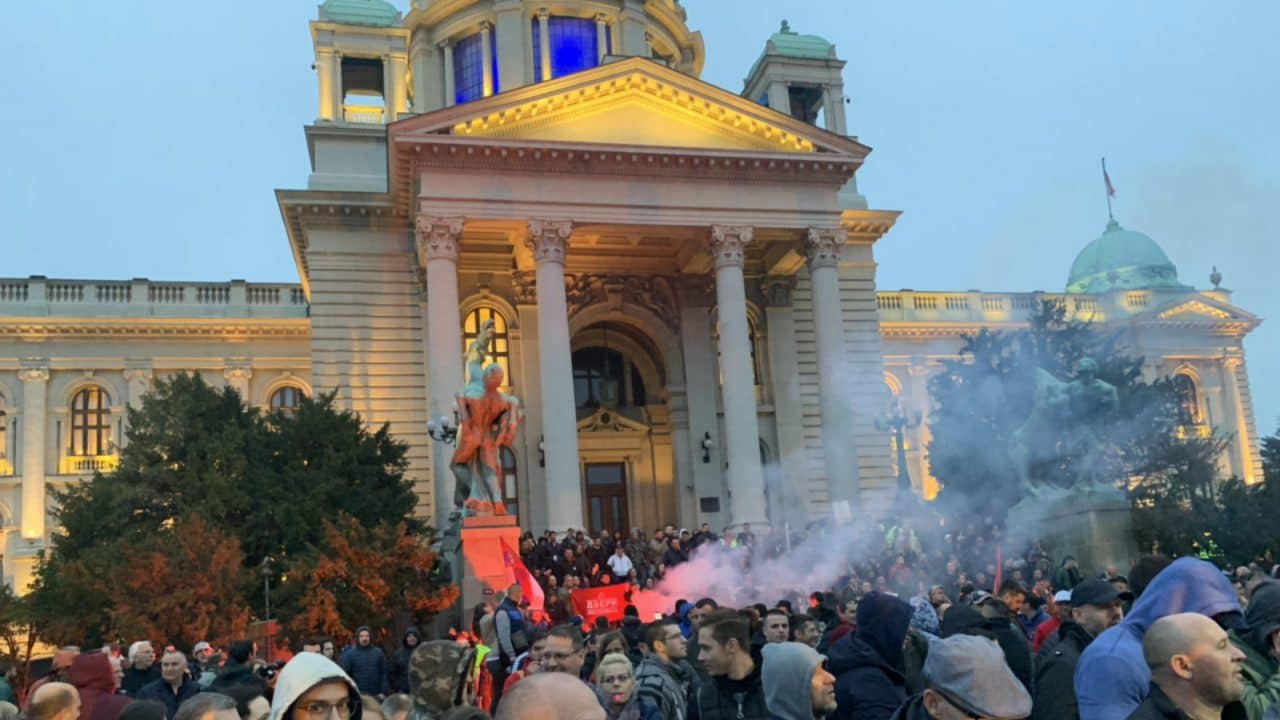[vc_row][vc_column][vc_single_image image=”106589″ img_size=”full” add_caption=”yes”][vc_column_text]Every Saturday, for the past five months, thousands of people have gathered on the streets of Serbian capital Belgrade to voice their dissent against President Aleksandar Vučić’s authoritarian tendencies and increasing control over the country’s media.
“Initially the protests were named ‘Stop the Bloody Shirts’,” Serbian journalist Lazara Marinkovic said. “And this was a reaction to an incident that happened in one city in Serbia, where Borko Stefanaović, an opposition leader, was physically beaten.”
Stefanaović, who was attacked last November in Kruševac, is the president of the political party Serbian Left and a founder of opposition coalition Alliance for Serbia. His assault, in which a masked group of assailants armed with bats and steel bars beat him, led to a rally in Belgrade.
“These people were saying that the beating happened as a result of political violence that the opposition is exposed to,” continued Marinkovic. “After one or two weeks, our president vucic had a reaction to those protests. He said ‘even if five million people were on the streets, (he) wouldn’t concede to their demands.’”
This sparked the formation of protests dubbed “one in five million” – a name lifted directly from Vučić’s comment. Though it remains uncertain whether the ongoing rallies will bring about change, Mitra Nazar, a Balkans correspondent for Dutch public broadcaster NOS, says it is “important” for protesters to demonstrate their unhappiness with Vučić.
“At this moment it’s about showing presence in the street more than actually having the feeling that they could change something,” said Nazar, who currently lives in Belgrade.
“I don’t think anybody in these protests believes that this could turn around now, but they do see this as part of a bigger movement that could eventually grow into something substantial, that could challenge the ruling party at elections.”
The demonstrations are the biggest since the fall of former President Slobodan Milosevic in 2000 – though lack of coverage in mainstream Serbian media would suggest otherwise. With Vučić pushing for Serbia to join the European Union, his grip on the media has tightened in efforts to appear stable to Brussels.
“Vučić wants to be the person that brings Serbia into the EU,” continued Nazar, “and in Brussels Vučić is still seen as a leader who can guarantee stability in the Balkans, and someone who’s willing to negotiate about a solution for the frozen conflict in Kosovo.
“His critics say the EU does not pressure Vučić enough on topics like media freedom, whilst they see his control over the media getting stronger.”
The country’s public broadcaster RTS has been targeted by demonstrators who are critical of the outlet’s coverage of the protests. The opposition says that, although reporting is completely neutral, it fails to ask why such a huge amount of people gather outside its headquarters in Belgrade every week.
“They are being biased,” added Marinkovic. “There was an incident when people who were demonstrating went inside the (RTS) building.
“They say that they didn’t go inside violently but some violence did happen because there was a lot of police who started kicking them out. Many people will agree that if these people do something violent, or vandalise something, it would be immediately used against them.
“They are trapped in a way they cannot really radicalise their protest. Nobody listens, nobody cares. It’s just like an echo chamber basically.”[/vc_column_text][vc_basic_grid post_type=”post” max_items=”4″ element_width=”6″ grid_id=”vc_gid:1556799282299-4d20cd01-70c2-7″ taxonomies=”7370, 113″][/vc_column][/vc_row]





